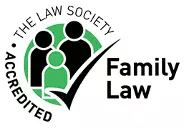Deciding which parent the children will live with
The law in respect of where a child in England & Wales lives is governed by the Children Act 1989. Whilst the phrase is still used today, the 'custody' of a child has not been used in the courts since October 1991.
 Until April 2014 the courts applied the terminology 'residence' for the parent with care of the child and contact for the non-resident parent. Since April 2014 the courts have used the phrase 'child arrangements order' to cover these issues. If you are seeking for your child to live with you it is a child arrangements - living with order and if you wish to see your child it is a child arrangements - spending time with order.
Until April 2014 the courts applied the terminology 'residence' for the parent with care of the child and contact for the non-resident parent. Since April 2014 the courts have used the phrase 'child arrangements order' to cover these issues. If you are seeking for your child to live with you it is a child arrangements - living with order and if you wish to see your child it is a child arrangements - spending time with order.
If such an order is made either for one person or on a shared basis then that person can take the child out of the jurisdiction of England & Wales for up to a month without the need to obtain the consent of the other parent unless a separate order is in existence stopping the same.
Most child arrangements orders remain in place until a child is 16 but in exceptional circumstances this extends to when a child is 18. Until 2001 the vast majority of private children cases led to a child living with one parent for the majority of time. Since then there has been a growing but still minority of cases where the child spends time with both parents by way of a shared child arrangements order.
The courts in England & Wales operate a no order policy i.e. they will only make an order if it is in the child's best interests to do so.
Meet Our Experts In Child Law
If you are seeking advice on a child related matter, Wikivorce can provide you with advice from one of our own Consultants or from one of our partner solicitors.
Ruth is a Divorce Consultant specialising in Child Arrangements.

Ruth is a Qualified Paralegal specialising in Family Law in both England/Wales and Scotland, with a particular interest in the law as it applies to children. She is the co-author of The Family Law A to Z - A reference book for litigants & students. This is a comprehensive and detailed A to Z of family law terminology and jargon, covering the English and Welsh jurisdiction.
She has a wide-ranging, in-depth understanding of family law both in England/Wales and Scotland, with a particular interest in the law as it relates to children. She has a comprehensive understanding of current legislation, procedures and forms.

Wikivorce is very proud of Ruth winning "Paralegal of the Year" in the 2015 Family Law awards.
Ruth has helped hundreds of Wikivorce clients who needed assistance with reaching agreement on child arrangements such as schooling issues, living arrangements, holiday planning, parental responsibility and a whole range of other issues.
Simon, our specialist and highly experienced child issues solicitor.

Simon is a partner at a successful law firm with a strong family law team that is recognised by the Legal 500 and Chambers directories for their high level of expertise and commanding knowledge of all areas of child law. Simon is a specialist in international child abduction law.
He is one of only a handful of qualified lawyers in the UK who is a member of the International Child Abduction Hague Convention and Wardship panel. Simon is one of the few recommended solicitors endorsed by Reunite and ICACU. His family law expertise includes ancillary relief matters, and he has a deep understanding of international family law. He recently became a member of the International Bar Association.

Simon is a partner and head of Family Law at a well highly respected law firm which has grown rapidly in the last few years and now has over 250 employees. They have a large and experienced family law department that is capable of handling complex cases involving divorce, finances and child contact/residence issues. They are fully accredited by the Solicitors Regulation Authority and follow their code of conduct.




 We acted for a mother who came to England from overseas with their 2 year old child. The father intended to come over to live in England after the separation. He applied for a child arrangements order.
We acted for a mother who came to England from overseas with their 2 year old child. The father intended to come over to live in England after the separation. He applied for a child arrangements order. We acted for a father who initially agreed arrangements with the mother on separation in respect of their two children. They agreed an equal time arrangement. As matters were civil between them they did not see the need to have the arrangements placed into a court order.
We acted for a father who initially agreed arrangements with the mother on separation in respect of their two children. They agreed an equal time arrangement. As matters were civil between them they did not see the need to have the arrangements placed into a court order.


